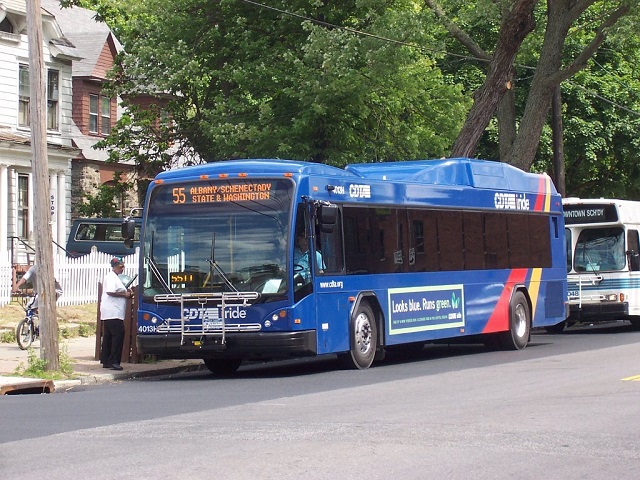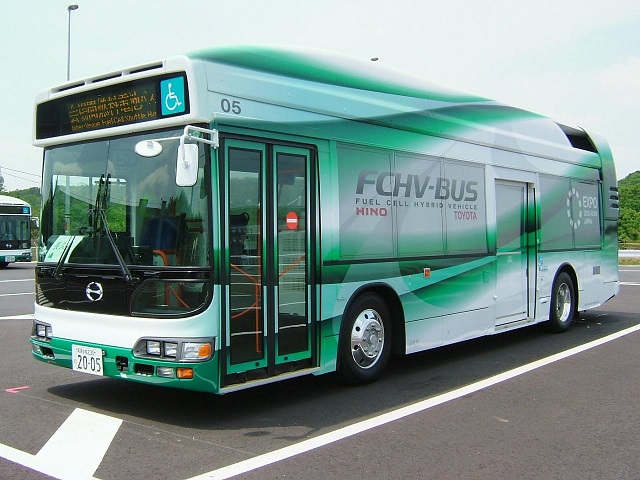
Image Credit: Adam E Moreira / Wikimedia Commons
The debate between battery-electric and hydrogen fuel cell technology for buses has been ongoing for years, with both sides having strong proponents. However, in recent years it seems that the pendulum has swung more in favor of battery-electric technology due to its falling costs and increasing efficiency. But overall, your best choice depends on the features you prioritize in a vehicle.
Battery-Electric Buses
Battery electric vehicles (BEVs), also known as all-electric cars, are powered by electricity from batteries. BEVs have become increasingly popular in recent years due to advances in battery technology and the desire to reduce dependence on fossil fuels.
There are different BEVs, including those with range extenders and those without. Range extenders are small gasoline engines that generate electricity to extend the range of the BEV beyond what the battery alone would allow. BEVs without range extenders are sometimes referred to as pure electric vehicles (PEV).
The advantages of BEVs over traditional gasoline-powered cars are their much lower emissions, particularly greenhouse gases like carbon dioxide; their significantly cheaper operating costs; and, for some drivers, the feeling of increased power and torque.

Image Credit: CC BY-SA 3.0, Wikimedia Commons
Hydrogen Fuel Cell Buses
Hydrogen fuel cell buses have recently gained popularity as a clean and efficient alternative to traditional diesel-powered buses. Fuel cells convert chemical energy into electrical energy, with water and heat as the only byproducts, making them much cleaner than internal combustion engines, which produce harmful emissions like carbon dioxide and nitrogen oxides.
Fuel cell buses are also more efficient than diesel buses, meaning they use less fuel to travel the same distance. That results in significant cost savings for bus operators and reduced environmental impact.
Efficiency Comparison
Energy Efficiency
The battery-electric bus is more efficient than the hydrogen fuel cell bus in terms of overall energy efficiency. The difference is that the battery-electric bus uses a single energy source (electricity) to power its motor. In contrast, the hydrogen fuel cell bus relies on two energy sources (hydrogen and oxygen) to generate electricity to power its motor.
The overall efficiency of a battery-electric bus is about 85-90%, while the overall efficiency of a hydrogen fuel cell bus is only about 60-70%. It means that, for every 100 units of energy input, a battery-electric bus will use about 85-90 units of that energy to move the vehicle, while a hydrogen fuel cell bus will only use about 60-70 units of that energy to move the vehicle.
Carbon Dioxide Emissions
The battery-electric bus is also more efficient than the hydrogen fuel cell bus in carbon dioxide emissions. The reason for this is that, while both buses produce emissions when operating, the battery-electric bus emits no gas when it is not running (i.e., when it is plugged into the grid). On the other hand, the hydrogen fuel cell bus produces emissions even when it is not being used, as a result of the need to constantly replenish its supply of hydrogen. Overall, the battery-electric bus is more efficient than the hydrogen fuel cell bus in terms of energy efficiency and carbon dioxide emissions.
Energy Storage
Hydrogen fuel cells are much more efficient than batteries in converting stored energy into usable power. That means that more of the energy stored in a fuel cell can be used to power the bus compared to a battery which will lose some of its stored energy as heat during the conversion process.
Hydrogen fuel cells have a much higher capacity than batteries, meaning they can store more energy for a given weight, making them ideal for applications where space is limited, such as in buses. Hydrogen fuel cell buses are superior to battery-electric buses when storing surplus renewable energy.
Drawbacks
There are a few drawbacks to battery-electric and hydrogen fuel cell technologies that need to be considered when choosing which type of vehicle is right for you. Battery electric vehicles can take a long time to charge, and the range may not be suitable for long-distance travel. Hydrogen fuel cells require dedicated infrastructure for refueling, which can be expensive to build and maintain.
Both battery electric and hydrogen fuel cell vehicles have high initial costs, but battery electric vehicles tend to be more expensive in the long run. Hydrogen fuel cell technology is still relatively new, so there are some uncertainties about its long-term viability.
What makes Battery-Electric Buses the Clear Winner?
There are a few key reasons why battery-electric buses have become more popular than hydrogen fuel cell buses. First, battery-electric buses are much cheaper to operate and maintain than their hydrogen counterparts. That is because batteries can be easily recharged, while hydrogen fuel cells need to be regularly replaced.
Second, battery-electric buses emit far less pollution than hydrogen fuel cell buses. No combustion is involved in powering a battery-electric bus, whereas hydrogen fuel cells produce emissions as a byproduct of the chemical reaction that produces electricity.
Finally, battery-electric buses are much more efficient than hydrogen fuel cell buses. They can store more energy in their batteries than hydrogen fuel cells, enabling them to travel further on a single charge.
Where does the Future of Passenger Transport Lies?
The future of passenger transport lies in battery electric vehicles (BEVs). BEVs are more efficient than hydrogen fuel cell vehicles and emit no pollutants. But BEVs have one big drawback: their batteries are expensive. But as the cost of batteries continues to fall rapidly, BEVs will be cheaper to operate than hydrogen fuel cell vehicles within a few years. Also, the range of BEVs is increasing as battery technology improves, making BEV buses more practical for long-distance travel.
There is no clear winner between battery-electric and hydrogen fuel cell buses regarding range or refueling time. However, battery-electric buses have numerous advantages over their hydrogen fuel cell counterparts. Hydrogen fuel cells may be the better option if you prioritize range. But if you prioritize refueling time, a battery-electric bus may suit you. Ultimately, your best choice will depend on your specific needs and preferences.



